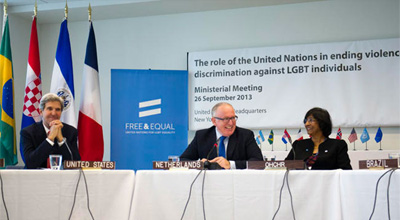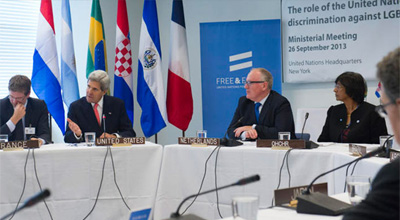The U.S. Secretary of State John Kerry, the foreign ministers of Argentina, Brazil, Croatia, the Netherlands and Norway, the French minister for development cooperation and senior officials from Japan, New Zealand and the European Union took part in a groundbreaking ministerial meeting on violence and discrimination against lesbian, gay, bisexual and transgender (LGBT) persons at the UN in New York on September 26. The meeting was also attended by the executive directors of Human Rights Watch and the International Gay and Lesbian Human Rights Commission.
The Office of the United Nations High Commissioner for Human Rights (OHCHR) noted that the meeting marked the first time the topic is being discussed at a Ministerial-level meeting at the United Nations. The meeting was held on the margins of the General Assembly’s annual high-level debate.

Participants at the Ministerial meeting on the Role of the United Nations
in Ending Violence and Discrimination against lesbian, gay,
bisexual and transgender (LGBT) people. UN Photo/Amanda Voisard
See more photos here.

Foreign ministers attending the meeting adopted a declaration pledging not just to protect LGBT rights but also to counter homophobic and transphobic attitudes in society at large, including through public education campaigns.
UN High Commissioner for Human Rights Navi Pillay commended their resolve to act, but stressed many more challenges remain on this issue.
In her remarks, the High Commissioner highlighted the remarkable progress made in the past decade in securing the human rights of members of the LGBT community. “Many countries have embarked on historic reforms – strengthening anti-discrimination laws, combating hate crime against LGBT people and sensitising public opinion,” she noted.
However, in spite of advances, serious challenges remain. “Not a week goes by without my Office receiving reports of brutal violence and intimidation, police harassment and widespread discriminatory treatment affecting LGBT people around the world. Those who speak out in defence of the rights of LGBT people risk persecution and assault and even, in some countries, legal sanctions”, she said.
Pillay reminded Ministers that in some places, conditions for LGBT people were deteriorating, not improving, citing as examples regressive new laws proposed or adopted in the past twelve months in several Eastern European and African countries.
The High Commissioner spoke about the resistance she sometimes meets when she raises the need for measures to protect the rights of LGBT people with Government representatives. “They say that same-sex relationships and transgender identities go against their culture, religious beliefs or traditional values. My answer is that human rights are universal,” she said.
“Our campaign on behalf of marginalised communities will meet resistance, even opposition. We must not be discouraged. We must stay engaged. Let us keep voicing our concerns, let us keep finding new allies, sharing good practice and standing fast alongside local human rights defenders on the front lines of this struggle.” the High Commissioner was quoted as saying in an OHCHR media statement.
More than 76 countries still criminalise consensual adult same-sex relationships, while in many more countries discrimination against LGBT people is widespread – including in the workplace and in the education and health sectors.
In July, OHCHR launched Free & Equal, a global public information campaign to promote respect for the human rights of LGBT people everywhere. For more information on the campaign, and to access and share campaign materials, please visit www.unfe.org or follow the campaign on Facebook (facebook.com/free.equal) or Twitter (@free_equal)











 列印版本
列印版本


















讀者回應
We have still to see Japan allowing foreigners entrance visas,
footed on same sex relations...
Get your own house in order before attempting to counteract
homophobic attitudes abroad !!!
(a) Repeal s377a. Any legislation that criminalises consensual sex between adult males is unconstitutional and a violation of human rights; and
(b) Enact anti-discrimination legislation to protect ALL people, regardless of race, religion, sexual orientation, gender identity and place of origin, against, amongst other things, workplace discrimination.
Singapore is badly in need of anti-discrimination laws and, because of their conspicuous absence from our statute books, the job security of employees is often left to the whims and machinations of unscrupulous employers (including state-owned enterprises and government agencies).
UN, this country called Singapore is supposed to be a "first world" nation. What is a "first world" country if not one that espouses and lives by the universal principles of human rights that apply equally to ALL its citizens? I know for a fact that the LGBT community in Singapore has NO protection whatsoever against employer and government abuse. So, shouldn't the UN pressure the Singapore government to walk the "first world" talk and not just pay lip service to universal suffrage through the state-controlled media and press?
So do something about it and make the countries who are members reform...
May this world be a better place for everyone.
but Religion is really like snake in camuflage
even Religion can create UN phobic.
homophobic and another phobic
mean that religion should be over UN position
those are religion follower will get phobic after homophobic accomplish
you will get turn respectively
請先登入再使用此功能。